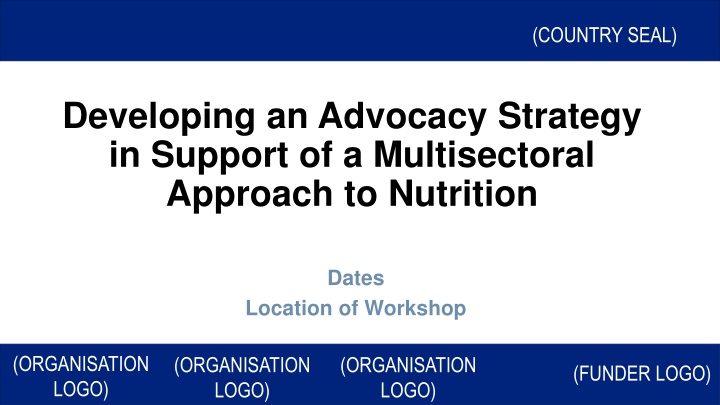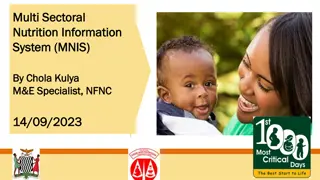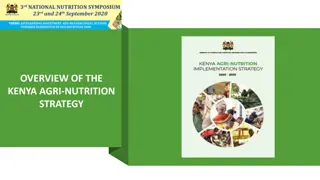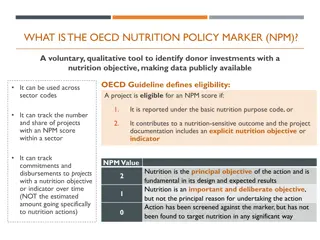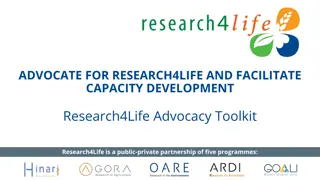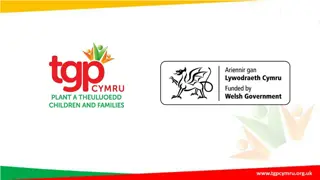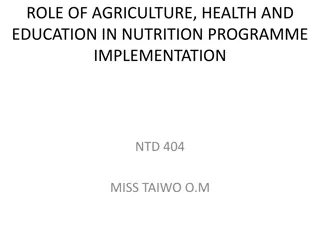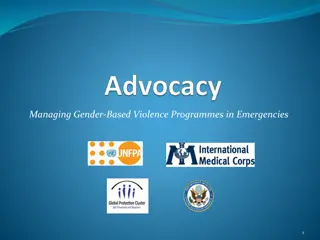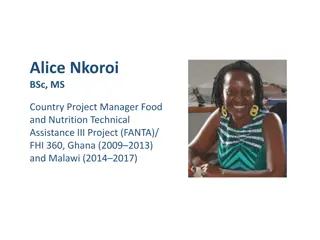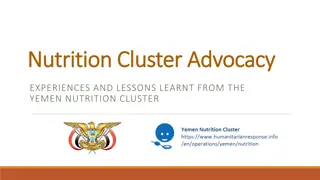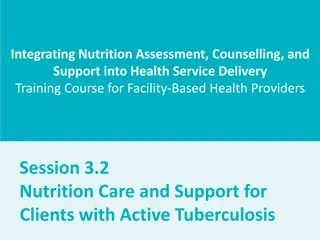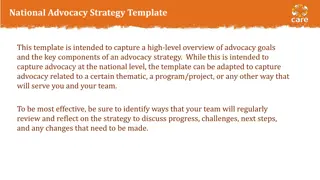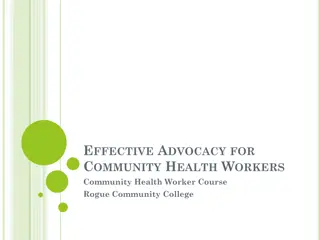Developing an Advocacy Strategy for Multisectoral Nutrition Approach Workshop
This slide deck was used by MQSUN+ to support countries in developing advocacy strategies for their multisectoral nutrition plans. It provides tools and resources for leading discussions and group sessions within advocacy workshops. The objectives include raising awareness, creating an enabling policy environment, establishing institutional frameworks, mobilizing civil society, and enhancing capacity in priority nutrition interventions.
Download Presentation

Please find below an Image/Link to download the presentation.
The content on the website is provided AS IS for your information and personal use only. It may not be sold, licensed, or shared on other websites without obtaining consent from the author.If you encounter any issues during the download, it is possible that the publisher has removed the file from their server.
You are allowed to download the files provided on this website for personal or commercial use, subject to the condition that they are used lawfully. All files are the property of their respective owners.
The content on the website is provided AS IS for your information and personal use only. It may not be sold, licensed, or shared on other websites without obtaining consent from the author.
E N D
Presentation Transcript
(COUNTRY SEAL) Developing an Advocacy Strategy in Support of a Multisectoral Approach to Nutrition Dates Location of Workshop (ORGANISATION LOGO) (ORGANISATION LOGO) (ORGANISATION LOGO) (FUNDER LOGO)
About This Tool Background: This slide deck was used by MQSUN+ to support countries in the development of an advocacy strategy for their multisectoral nutrition plan (MSNP) via an in-country advocacy workshop. Objectives: There are many different approaches to conducting a nutrition advocacy workshop. This slide deck aims to provide countries with a curated set of tools and resources for leading various plenary discussions and group work sessions within an advocacy workshop to develop key components of the advocacy strategy to support their MSNP. This is not intended to serve as a comprehensive advocacy workshop presentation and should be supplemented with additional country- specific information. Additional information and context about each slide is included in the notes section at the bottom of each slide.
Global Advocacy-Related Tools & Resources Global Nutrition Cluster (2016): Nutrition Cluster Advocacy Toolkit United Nations Children s Fund (UNICEF) (2010): UNICEF Advocacy Toolkit Food and Nutrition Technical Assistance (FANTA) III (2018): FANTA III Country-Level Multi-Sectoral Nutrition Advocacy Toolkit Global Breastfeeding Collective (2019): Breastfeeding Advocacy Toolkit Scaling Up Nutrition (SUN) Youth Leaders for Nutrition (2019): Youth Leaders for Nutrition Advocacy Toolkit Action Against Hunger (2015): Implementation of the SDGs at the National Level: How to Advocate for Nutrition-Related Targets and Indicators
Illustrative Advocacy Strategy Objectives Create an enabling environment in order to operationalise the MSNP to reach its goals: Raise awareness and sensitise decision-makers in sectoral ministries on the importance of a multisectoral approach in order to support the design and implementation of nutrition-sensitive interventions. Create an enabling policy and regulatory environment for nutrition- specific interventions to be implemented: develop a national nutrition policy and implement the regulation on decentralisation. Support the establishment and strengthening of a multisectoral institutional framework for nutrition. Mobilise civil society organisations to generate social accountability, and encourage communities to demand access to nutrition services. Build the capacity and enhance the skills of concerned sectors staff and caregivers on priority nutrition interventions, innovative approaches and financing schemes for ensuring food security.
Existing Advocacy Initiatives What existing advocacy initiatives do you know of that are relevant to nutrition? Discuss advocacy materials from various nutrition-related platforms or campaigns that could be leveraged (e.g. Baby- Friendly Hospital Initiative).
Selecting Target Audiences Plenary work #1: Target audience mapping Source: FANTA III (2018). Manual for Country-Level Nutrition Advocacy Using PROFILES and Nutrition Costing.
Analysing & Prioritising Target Audiences Plenary work #2: Target audience analysis 2 Source: Adapted from Imperial College London (2017). Stakeholder Management.
Emerging Core/Headline Messages Plenary work #3: Identifying emerging key messages Guiding questions for discussing the key messages are: What is the problem? (Key facts/scope of the problem of malnutrition in your context) What are the obstacles? What do we propose? Why a multisectoral approach to nutrition? (Call to action) What would be the impact?
Crafting Audience-Specific Messages Group work #1: Key messages for each prioritised target audience group Target Audience: [Insert audience group here] Desired change Key barriers Advocacy intent Messages Source: Adapted from FANTA III (2018). Manual for Country-Level Nutrition Advocacy Using PROFILES and Nutrition Costing.
Identify Activities for Each Audience Group work #2: Guiding questions to identify activities 1. What formats have proven to be effective? Which communication medias does this audience use? 2. What language(s) does this audience prefer? 3. Is this channel/activity best suited for this content? 4. Is the activity realistic/feasible with the allocated resources? FOR EACH AUDIENCE GROUP
Crafting Audience-Specific Messages Group work #3: Detail activities for each prioritised audience TARGET AUDIENCE: MNSP-related objectives: 1. 2. 3. Desired change Key barriers 1. 2. 3. Advocacy intent Key messages 1. 2. 3. Indicators 1. 2. 3. IMPLEMENTATION PLAN Activities Timeline Proposed responsible organisation Proposed supporting organisations Materials to support activity Indicators Means of verification Source: Adapted from FANTA III (2018). Manual for Country-Level Nutrition Advocacy Using PROFILES and Nutrition Costing.
Advocacy Opportunities/Moments Plenary work #4: Marking on a timeline the key events/opportunities for advocacy in the next 18 months World HIV/AIDS Day Approval of National Child Health Strategy Independence Day National Children s Month International Women s Day Establishment of subnational health committees National Children s Month Global Campaign for Education Global Campaign for Education World Breastfeeding Week January April July October January April July World Malaria Day World Malaria Day National NGO Day Budget session of the national assembly National Youth Day Global Campaign for Education Child Health Week Budget Allocation Day National Day of Women and Girls National Day of Women and Girls Polio and Vit A Campaign
Next Steps Sectoral/ministry delegates: continue developing and finalising key messages for each target audience. Advocacy strategy development lead/coordinator: gather key messages by audience from each ministry to move forward with strategy development. All participants: please complete post-workshop evaluation survey by end of today to provide feedback.
MQSUN+aims to provide the UKs Foreign, Commonwealth and Development Office (FCDO, formally DFID) with technical services to improve the quality of nutrition-specific and nutrition-sensitive programmes. The project is resourced by a consortium of five leading non-state organisations working on nutrition. The consortium is led by PATH. The group is committed to: Expanding the evidence base on the causes of undernutrition. Enhancing skills and capacity to support scaling up of nutrition-specific and nutrition-sensitive programmes. Providing the best guidance available to support programme design, implementation, monitoring and evaluation. Increasing innovation in nutrition programmes. Knowledge-sharing to ensure lessons are learnt across DFID and beyond. MQSUN MQSUN+ + Partners Partners Aga Khan University DAI Global Health Development Initiatives NutritionWorks PATH Contact Contact This presentation was produced by MQSUN+ through support provided by UK aid and the UK Government; however, the views expressed do not necessarily reflect the UK Government s official policies. PATH | 455 Massachusetts avenue NW, suite 1000 | Washington, DC 20001 | USA Tel: +1 (202) 822-0033 Fax: +1 (202) 457-1466 Tool Acknowledgements
